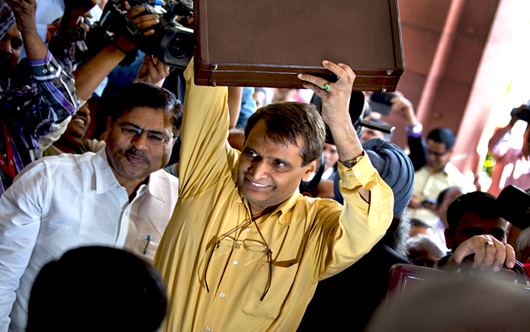New Delhi, Feb 26: Railway Minister Suresh Prabhu today spared passengers from any hike in fares but made changes in freight rates to rake in more money while ruling out privatisation.

Presenting the first full-fledged Rail Budget of the Modi government for 2015-16, he made adjustments in freight rates that exempted salt but would hike rates on carriage of cement, coal and coke, iron or steel and petroleum products.
The Budget also revised the commodity classification and distance slabs for carriage of commodities that can raise freight rates upto 10 per cent in some of the items.
The Minister did not project any figures that will accrue out of the adjustment in freight rates to be effective from April 1 this year.
"I have not increased passenger fares. We are directing our efforts to make travel on Indian railways a happy experience with a mix of various initiatives," he said as he laid out 11 major thrust areas of railways in the coming financial year.
He did not announce any new trains, saying on the ground that a review was on about the capacity to add more trains which will be announced after the review is over.
Against the backdrop of talk of privatisation of railways, the Minister said Railways will continue to be a precious national asset and people of India will own railways always.
In the hour-long speech, Prabhu unveiled the thrust areas as the national carrier to become the prime mover of economy again, resource mobilisation for higher investments, decongestion of heavy routes and speeding up of trains, passenger amenities and safety.
Outlining the budget estimates for the coming year, he proposed a plan outlay of Rs 1,00,011 crore, an increase of 52 per cent over revised estimate of 2014-15. Passenger earnings growth has been pegged at 16.7 per cent and earnings target budgeted at Rs 50,175 crore.
Goods earnings is accordingly proposed at Rs 1,21,423 crore, which includes rationalisation of rates, commodity classification and distance slabs.
Other coaching and sundries are projected at Rs 4612 crore and Rs 7318 crore. Gross traffic receipts are estimated at Rs 1,83,578 crore, a growth of 15.3 per cent.
Prabhu said over the next five years, Railways envisage an investment of Rs 8.5 lakh crore for which a broad indicative investment plan has been prepared.
"But the scale of investment needs is such that it will require us to seek multiple sources of funding. We will tap other sources of finance. Multilateral development banks and pension funds have expressed keen interest in financing new investments.
"They seek sources of predictable and recurring revenue, which we can provide through the issuance of long debt instruments to fund revenue-generating railway projects," the Minister said.
The 11 thrust areas include cleanliness, new toilets covering 650 new stations, bio-toilets, national fashion technology to design bed linen, online disposal of bed rolls, and 24x7 helpline number for security related complaints.
An 'Operation five minutes' will be introduced for issuing unreserved tickets besides other initiatives like hot buttons, coin vending machines and concessional e-tickets for differently-abled passengers.
E-catering will be launched for select meals from an array of choices, ordering food through IRCTC websites at the time of booking tickets and integrating best food chains into the project.





Comments
Add new comment